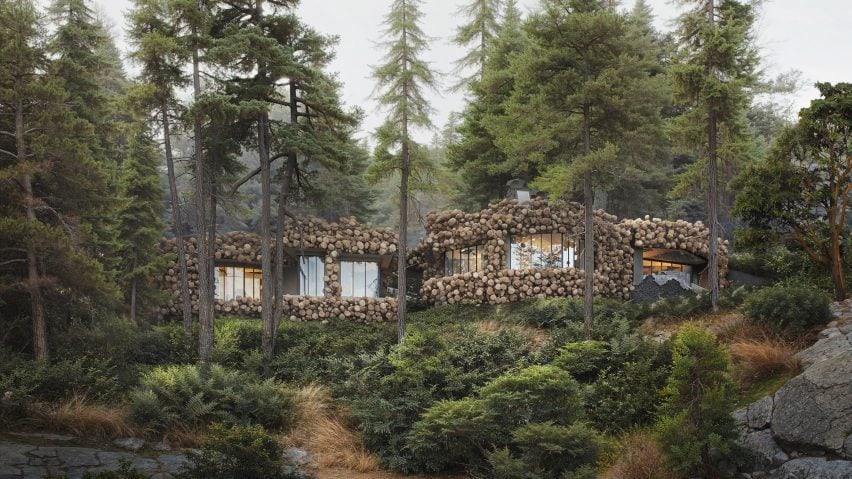Canada-based designer Omer Arbel has unveiled designs for a series of homes in Washington State made from concrete and covered in wooden balls intended to cultivate ecosystems over time.
Arbel, the founder of lighting brand Bocci, was commissioned to design 16 houses on Governor's Point, a peninsula that juts into Bellingham Bay north of Seattle. The land was purchased by Arbel's business partner, Randy Bishop.
Called 94, the houses would be made mostly of concrete with cavern-like entryways and breezeways woven through the forested site. The collection of residences was designed to form a micro-community connected to the local grid and ring the edge of the peninsula.
Arbel told Dezeen that he designed them to mesh with, and possibly aid, the ecology of the site.
"The houses aim to enmesh themselves in the site in such a way that they become contributing elements in the microecology at both a macro and micro level," said Arbel.
"We aim not only to limit the harm of the development to the ecosystem but hopefully, over time, to even contribute to its resiliency and health."
This enmeshment can be seen in the renderings of "cedar orb clouds" suspended from the concrete facade. These orbs would be made from polished burls – the unusable bottom of trees.
Arbel said the hope is that they silver and become covered in moss to create "vast and varied" ecosystems.
The concrete architecture will feature patterns made in the negative of the burls on the facade and on the exposed concrete walls of the interior.
Arbel said the design was configured to make the experience of the site "visceral and intense".
"The houses are organized as a set of sectional relationships encouraging cinematic awareness of other occupants in the home," said Arbel.
"The houses present a contrast between the rough and unruly site-derived elements such as the cedar orb cloud, or the void form of the orbs in the concrete on the one hand, and the ambitiously precise, well crafted and rigorous interior elements on the other hand, such as machined millworker elements, windows and doors sinks and tubs."
Each house will have different layouts, with the style, materials and basic interaction remaining the same while "in service of celebrating the poetry and uniqueness of its particular site", Arbel said.
On the cliff-facing side, the houses will have cantilevers over the ocean and floor-to-ceiling glass that provides views of the Olympic Mountains across the bay.
Entry to the structures will be through a "descent underground" according to Arbel, as they will be partially buried on the site. Concrete overhangs will cover outdoor disparate parts of the structures, creating a cave-like effect.
Arbel said that the design intends to force people to interact with the environment.
"A celebration of the experience of being outside in all weather; a breezeway connects the principal bedroom to the main living spaces of the house such that occupants must go outside to go back in, and vice versa," he said.
In addition to water retention and other careful land management techniques, Arbel said that a portion of the property will be put into a land trust to help manage the health of the ecosystem.
The first of the homes is currently under construction.
Beyond his work for Bocci, Arbel's creative studio has completed several architectural projects including a home with concrete pillars made from fabric formworks.
He has showcased his material experimentations in international venues, such as a show at Carwan Gallery in Athens.
The imagery is by CUUB.

